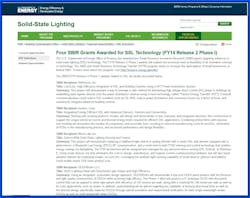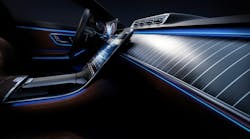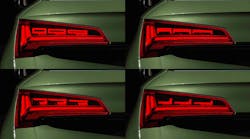The US Department of Energy (DOE) has announced fiscal year 14 (FY14) Release 2 Phase 1 Small Business Innovation Research (SBIR) funding grants to VoltServer, Innotec, Mojo Labs, and OLEDWorks for projects related to solid-state lighting (SSL). The agency as also updated its SSL Research and Development Multi-Year Program Plan (MYPP) identifying new areas in research and product development that require study for both LED and OLED lighting. The agency also has a new fact sheet on LEDs and health that documents the system-level benefits that can be engineered in LED lighting to improve our wellbeing.
SBIR grants
The SBIR grants are intended to allow smaller organizations the opportunity to explore the feasibility of new ideas that could lead toward improvements in LED- and OLED-based lighting with the DOE's ultimate goal of supporting technology developments that can truly reduce long-term energy consumption in the US. The program has a long history of funding.
Related article: Pixelligent awarded SBIR grant to develop nanoadditives for OLED lighting
In the latest round of grants, VoltServer will study the use of a high-voltage DC grid to power buildings, and especially lighting, while also enabling network connection to luminaires. The company believes that the technology it calls Packet Energy Transfer could reduce the installed cost of SSL systems by 20-30%, thereby boosting the deployment of LED or OLED lighting, while also improving energy-conversion efficiency.
Innotec, meanwhile, is working on a new construction methodology for LED-based lighting products. The company hopes to use an integrated electronic film that can be applied over injection-molded bodies that will serve the electrical and thermal requirements of an SSL product. The technology could lower SSL product costs by eliminating the need for dedicated printed circuit boards.
MoJo Labs is working in the area of adaptive controls. The company hopes to leverage Bluetooth Low Energy wireless technology and what it calls task-to-wall (TTW) sensing technology to make optimal use of daylighting, allow simple control of a lighting system from smart devices, and maximize the energy savings in LED-based lighting installations.
OLEDWorks will study methods to boost efficacy in OLED panels while also developed thing panels with improved directional control of the light emitted from the panel. The company hopes to realize 60-lm/W white panels while also researching color and tunable-white technologies.
Update on MYPP
Moving to the MYPP, the DOE updates its research plan every year based on developments in SSL and identifies new research areas that could lead to less energy usage. The plan covers both LED and OLED technology.
The 2014 update just published includes core technology research and product development in the LED and OLED areas. In LEDs, new research is needed on emitter materials, down-converters (phosphors), and light quality. New product development tasks would focus on LED system reliability and lifetime, and on new and novel approaches to LED system design.
Related article: DOE announces new 2014 funding for SBIR/STTR SSL-centric R&D
In the LED area, new OLED research task requirements should focus on stable white OLED panels, and new light extraction and utilization techniques. The identified product development tasks are similarly focused on panel light extraction, and novel luminaire designs. These new tasks could be funded in future SBIR or Small Business Technology Transfer (STTR) funding phases.
LED lighting and health
The DOE also continues to study the impact of LED lighting on health and wellbeing. The agency has published a new fact sheet on the topic. The latest work states that LEDs are not inherently more hazardous or beneficial to our health than other light sources. But the DOE said that the ability of controlling the spectrum in LED-based lighting can enable SSL systems that positively benefit wellbeing and productivity.





